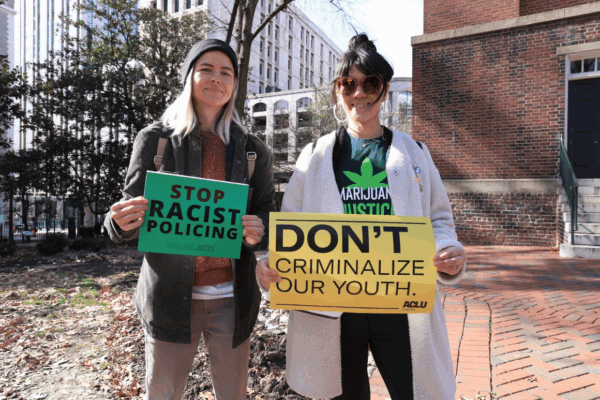In early January, Gov. Ralph Northam introduced his agenda, which included “marijuana decriminalization,” giving the illusion that Virginia is moving toward actual criminal legal reforms. Unfortunately, as introduced on behalf of the Governor, HB 972 would cause more harm to Black and brown people and strengthen the school-to-prison pipeline for our youth.
Once the ACLU of Virginia and its coalition partners learned the real impact of the administration’s legislation, the group notified the governor, attorney general, the Virginia Legislative Black Caucus, along with all legislators of the negative impact that HB972 and a similar Senate proposal in SB2 would have on the communities already harmed most by the war on drugs. True marijuana reform can start now by simply repealing the ban on simple marijuana use and possession from the Virginia criminal code, and by not adding any criminal or civil penalties.
The ACLU of Virginia joined forces with Marijuana Justice to co-host a Marijuana Community Briefing on why decriminalization as proposed in SB2 and HB972 isn’t the right way forward. Our goal was to engage with community leaders who have already taken the lead in advocating for real reform. Advocates and partners including ACLU-VA’s legislative director Ashna Khanna, Richard Walker from Bridging the Gap, Gary Broderick from RISE for Youth, and community activist Sheila Bynum-Coleman participated in a panel discussion moderated by Chelsea Higgs Wise of Marijuana Justice. The panel raised their concerns with HB972 and SB2 and proposed a solution, House Bill 1507 introduced by Del. Jennifer Carroll Foy, that repeals the prohibition of simple marijuana possession and use without additional fees or crimes.
“It seems like in the front, [HB972 and SB2] are taking a step forward, but in the back door, it’s another way to get Black and brown people into the criminal legal system,” said Khanna. “Racial disparities in policing are evident when records show Black Virginians are 3.4 times more likely to be arrested for marijuana offenses; this is up from 2.7 times in the last decade.”
Many event attendees arrived with the same question: Why is the ACLU against marijuana decriminalization proposals that are seen as moving Virginia in the right direction? The answer is simple. As proposed, the so-called decriminalization bills don’t do anything to combat racial disparities in enforcement, continue to criminalize youth who use marijuana and deprive people who are still defined as violating the law of access to counsel if they want to challenge the citation and civil penalty they would still receive.
The panelists often spoke from personal experience on how current marijuana laws are being disparately used against Black and brown people and as a pretext to pull over and search their cars — emphasizing that the proposed decriminalization bills, which include civil penalties enforced by police, would allow this pattern to continue.
“I stand against these decriminalization bills because they do not do enough. They will not stop bad policing, racism, and injustice. My husband was strip-searched on the side of the road because the officer ’smelled marijuana.’” said Bynum-Coleman.
Walker said, “We cannot go for the setup with Gov. Northam’s decriminalization bill that creates other possible criminal charges.”
Also, HB972 as passed by the House of Delegates, if not amended, would punish our youth more harshly than adults by making them delinquents, taking away their driver’s license, and subjecting them to mandatory regular drug testing.
“We want laws that promote young people’s ability to learn and grow from mistakes, not trap them and funnel them into the juvenile legal system,” said Broderick.
Communities of color have waited long enough for true leadership from their lawmakers and are urging them to stand strong and lead the way for equitable marijuana reform.
“People often say marijuana is a gateway drug, but for me, it has always been a gateway drug to the incarceration system,” said Wise.
Many attendees were surprised to learn that it is misleading to call the proposed legislation decriminalization and that, as proposed, the outcome will be continued harm to people of color, especially youth.
Khanna added that the fact that HB972 and SB2 still make it a violation of law to possess even small amounts of marijuana could affect people from all walks of life. If someone agrees to pay the proposed civil penalty, they are admitting that they violated the law and may be required to report that law violation when seeking to enlist in the military, applying for a college loan or for housing assistance, and other opportunities. The fact that the penalty for violating the law would be a civil penalty does not change the fact that possession would still be illegal and that admitting to that violation would not have some of the same consequences as pleading guilty to a violation with criminal penalties.

